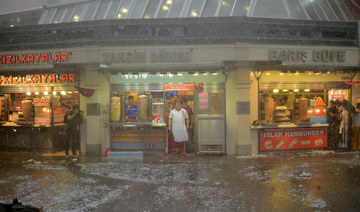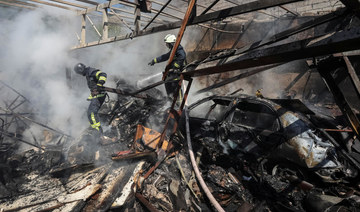GERMANY’S NEO-NAZIS are hanging up their bomber jackets, unlacing their black leather boots and even grabbing a bite to eat at their local Turkish kebab shop.
Eschewing their predecessors’ fierce aversion to anything “un-German,” they blend into the local community and easily escape detection. But police and experts say this new generation of young fascists is potentially far more dangerous and reckless than their older peers.
“Today a neo-Nazi can eat Turkish kebabs and still go out and beat up immigrants,” said journalist Johannes Radke, who has reported on the German far-right for more than a decade.
“They say, ‘We’ll let everyone do whatever they want as long as they’re a Nazi at heart.’“
Headquartered in the down-at-heel western industrial city of Dortmund, a new group known as the Autonomous Nationalists (AN) is at the forefront of this transformation.
They share the hard-core xenophobia of older cadres in the far-right, but their appearance and tactics are those of a dynamic, Internet-savvy youth movement.
They wear stylish running shoes and expensive brand name windbreakers and communicate with each other via Twitter. The use of English slogans at protests, for decades taboo in far-right circles, is widespread.
“They see themselves as the avant-garde of the Nazi scene,” Radke said. “They’re much more professional than some drunk, dim-witted skinhead — and more dangerous.”
Authorities and residents across Germany have become more sensitive to the threat of far-right militants since revelations last year that a neo-Nazi cell waged a seven-year racist killing spree throughout the country, murdering nine people, mostly ethnic Turks, one of them in Dortmund.
The cell’s existence only came to light by chance after two members committed suicide following a botched bank robbery. The murders forced an overhaul of Germany’s intelligence services.
Nearly seven decades after the fall of Adolf Hitler’s Nazi regime, far-right groups remain marginalized in Germany, with most of their support tending to come from the impoverished former communist east.
But the so-called ‘Zwickau cell’ shows that the danger is not confined to any one area of the country. Left unchecked, experts say, neo-Nazis could again stage deadly attacks.
This year, keen to show they take the threat seriously, federal authorities have been weighing a possible ban on the only far-right party to hold seats in any German legislature.
The National Democratic Party (NPD), which sits in two state assemblies, is racist and anti-Semitic, intelligence services say. The party is careful not to break German laws forbidding Nazi symbols, denial of the Holocaust and public expressions of support for Hitler.
The Autonomous Nationalists have no such qualms. They have no appetite for political manoeuvering and readily unfurl banners quoting Hitler at their protest rallies.
“Many Nazis moved here because they thought this was a broken city,” Dortmund mayor Ullrich Sierau told Reuters, adding that extremists exploited the fact the city of half a million has one of the highest unemployment rates in the region.
Dortmund’s new police chief Norbert Wesseler said there were 131 crimes tied to far-right militants including violent assaults in the city in the first half of the year.
“The number of offenses has risen considerably over earlier years,” he added, without giving comparative figures.
A former neo-Nazi from eastern Germany, who has since left the scene and spoke to Reuters on condition of anonymity for fear of reprisals, said new recruits discover the Autonomous Nationalists are a restless bunch, always plotting their next move.
“When you’re in that scene, it’s like you’re living in a parallel universe to normal society,” said the 25-year-old, who never joined the AN but often stayed at its flats.
The neo-Nazis methodically prepare their attacks against anyone who opposes their radical views, he said.
Much of the work they do mirrors that of private investigators: researching targets, staking out locations and taking pictures of opponents to match faces to names.
Many do not work, living off welfare from a democratic state they vehemently oppose as well as donations from sympathetic outsiders.
“They are also able to secure weapons through contacts in other countries, such as Bulgaria or Switzerland,” he said. “If you need something, it’s possible for them to get it across the border.”
Alerted to the threat, Dortmund is among the cities that is taking measures.
Police raided AN clubhouses and apartments in Dortmund and two other cities in August, seizing weapons and propaganda material.
The authorities also outlawed the AN’s local branch there although no arrests were made.
“We’ve all gotten better at recognizing the relationship between criminal offenses and far-right extremist ideologies and realising that there is an organization behind the scenes that is calling the shots,” Wesseler said.
Wesseler said he had also increased police patrols in the area where the group rents its apartments.
There are signs the campaign may be working.
On Sept. 1, a date neo-Nazis mark to commemorate Nazi Germany’s invasion of Poland in 1939, the only visible banners were those urging fascists to leave town.
Lamp posts were newly painted with a special anti-adhesive to deter far-right vandals from defacing them.
A message has been displayed on top of Dortmund’s landmark U-Tower — a 1920s-era skyscraper crowned with an illuminated letter “U” and giant TV screens.
“I, the tower, have always thought Nazis were uncool,” it read.
Hajo Funke, a professor of political science and far-right expert at Berlin’s Free University, cautioned against complacency, however.
“If the ban isn’t enforced properly then nothing will happen,” Funke said. “Then they’ll be just as dangerous as before.”
German city battles elusive new-look neo-Nazis
German city battles elusive new-look neo-Nazis
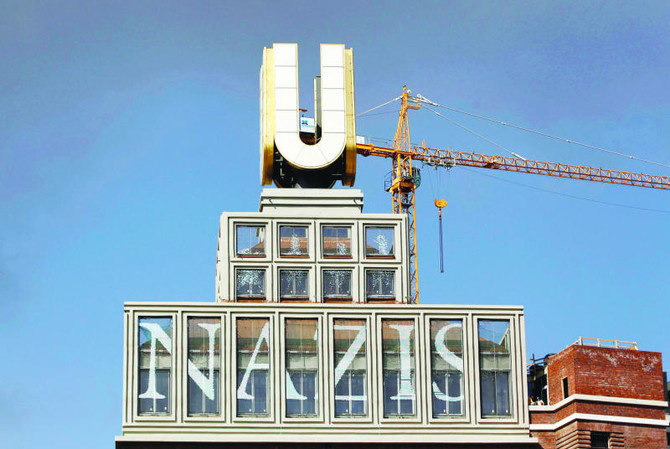
‘Miracle’ survivor found 5 days after building collapse

- When we went down to the side of the slab we had uncovered, we heard somebody inside, and we stopped all the heavy operations
JOHANNESBURG: Rescuers and onlookers cheered and applauded on Saturday as a survivor was rescued after 116 hours from underneath the rubble of a collapsed building in South Africa, with the tragedy having killed at least 13.
Provincial premier Alan Winde said on X: “It is a miracle that we have all been hoping for.”
An apartment block under construction in the southern city of George crumbled on Monday afternoon while an 81-person crew was on site.
“When we went down to the side of the slab we had uncovered, we heard somebody inside, and we stopped all the heavy operations,” Colin Deiner, head of rescue operations, told reporters.
Rescuers then called out to the survivor, and he spoke back, Deiner said.
“He indicated to us that he’s got weight on his legs, and we’re very concerned about that after such a long period.” After several hours, the survivor was extricated and rushed to a hospital.
Rescue teams have been working against time since the structure came crashing down.
Twenty-nine people were rescued alive, while thirty-nine remained unaccounted for.
Winde said a “difficult” identification process was underway, and police were using fingerprints, DNA testing, and photographs.
The city had approved construction plans for a 42-unit apartment block in July.
The reasons for the collapse are still unknown.
Biden jokes Trump should have injected himself with bleach

- Biden also made light of Trump’s “love letters” from North Korean leader Kim Jong Un
- In a senior moment, Biden mistakenly referred to Kim as the president of South Korea
PORTOLA VALLEY, California: US President Joe Biden joked on Friday that he wished former President Donald Trump had injected himself with a little bleach, resurrecting one of Trump’s more head-scratching moments from the early days of the coronavirus pandemic.
Biden, at a fundraising event south of San Francisco for his re-election campaign, said the presidency of his Republican opponent was chaotic and that voters should keep that in mind. Biden and Trump are locked in a close contest ahead of the November election.
“Remember him saying the best thing to do is just inject a little bleach in your arm? That’s what he said. And he meant it. I wish he had done a little bit himself,” Biden said.
During the early months of the pandemic in 2020, Trump said that an “injection inside” the human body with a disinfectant like bleach or isopropyl alcohol could help protect against the virus.
Biden also made light of what he called Trump’s “love letters” from North Korean leader Kim Jong Un, although Biden mistakenly referred to Kim as the president of South Korea.
Trump had met with Kim and exchanged a number of letters with him, copies of which he kept in a loose-leaf binder in the Oval Office.
A spokesperson for the Trump campaign did not immediately respond to a request for comment on Biden’s remarks.
Biden has made light of Trump’s bleach comment before, saying on April 24 in Washington that Trump had injected himself and “it all went to his hair.”
Meaty issue: German political party calls for €4.90 price cap on doner kebabs
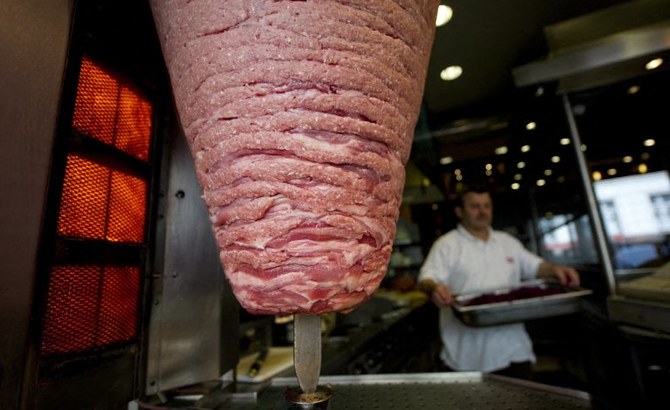
- Die Linke appeals to government as price of national favorite hits €10 in some cities
- Scheme would cost taxpayer about €4bn
LONDON: German political party Die Linke has urged the government to cap the price of a much loved food item — the doner kebab.
The party has proposed providing daily vouchers to households that would limit prices to €4.90 ($5.28) and €2.90 for young people under an initiative known as Donerpreisbremse.
The scheme is projected to cost the government about €4 billion.
Introduced after the Second World War by Turkish immigrants who adapted the dish to suit local tastes, the doner kebab is a national favorite in Germany, with an estimated 1.3 billion consumed annually. But their soaring price has become a hot-button political issue.
Die Linke said the cost of a doner kebab had reached €10 in some cities, from €4 just two years ago.
“For young people right now it is an issue as important as where they will move when they leave home,” said Hanna Steinmuller, a lawmaker with the Greens party.
“I know it’s not an everyday issue for many people here … but I think as voter representatives we are obliged to highlight these different perspectives.”
German Chancellor Olaf Scholz was famously confronted by a voter last year who demanded he “speak with Putin … I’m paying €8 for a doner.”
With public pressure mounting, Scholz recently acknowledged on social media that “everywhere I go, mostly by young people, I get asked if there should be a price cap for doner kebabs.”
Despite the appeals, the chancellor rejected the proposal, citing the impracticality of price controls in a free market economy.
Despite its humble origins as a street food, the doner kebab has become an unexpected point of political focus.
Last month, German President Frank-Walter Steinmeier sparked controversy when on a visit to Turkiye he gifted 60 kg of kebab meat from Berlin to Istanbul in what some called a clumsy attempt to symbolize the strong cultural ties between the two nations.
A 98-year-old in Ukraine walked miles to safety from Russians, with slippers and a cane
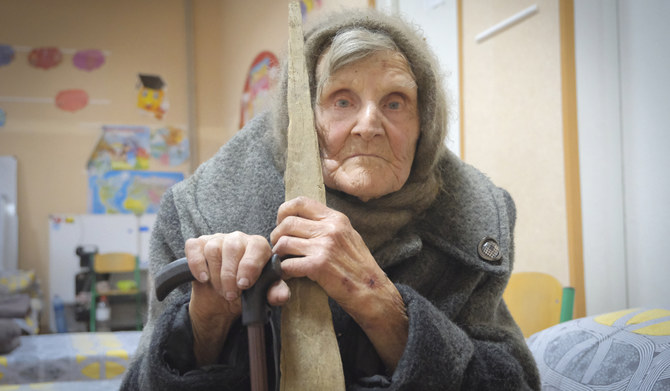
- Describing her journey, the nonagenarian said she had fallen twice and was forced to stop to rest at some points, even sleeping along the way before waking up and continuing her journey
KYIV, Ukraine: A 98-year-old woman in Ukraine who escaped Russian-occupied territory by walking almost 10 kilometers (6 miles) alone, wearing a pair of slippers and supported by a cane has been reunited with her family days after they were separated while fleeing to safety.
Lidia Stepanivna Lomikovska and her family decided to leave the frontline town of Ocheretyne, in the eastern Donetsk region, last week after Russian troops entered it and fighting intensified.
Russians have been advancing in the area, pounding Kyiv’s depleted, ammunition-deprived forces with artillery, drones and bombs.
“I woke up surrounded by shooting all around — so scary,” Lomikovska said in a video interview posted by the National Police of Donetsk region.
In the chaos of the departure, Lomikovska became separated from her son and two daughters-in-law, including one, Olha Lomikovska, injured by shrapnel days earlier. The younger family members took to back routes, but Lydia wanted to stay on the main road.
With a cane in one hand and steadying herself using a splintered piece of wood in the other, the pensioner walked all day without food and water to reach Ukrainian lines.
Describing her journey, the nonagenarian said she had fallen twice and was forced to stop to rest at some points, even sleeping along the way before waking up and continuing her journey.
“Once I lost balance and fell into weeds. I fell asleep … a little, and continued walking. And then, for the second time, again, I fell. But then I got up and thought to myself: “I need to keep walking, bit by bit,’” Lomikovska said.
Pavlo Diachenko, acting spokesman for the National Police of Ukraine in the Donetsk region, said Lomikovska was saved when Ukrainian soldiers spotted her walking along the road in the evening. They handed her over to the “White Angels,” a police group that evacuates citizens living on the front line, who then took her to a shelter for evacuees and contacted her relatives.
“I survived that war,’ she said referring to World War II. “I had to go through this war too, and in the end, I am left with nothing.
“That war wasn’t like this one. I saw that war. Not a single house burned down. But now – everything is on fire,” she said to her rescuer.
In the latest twist to the story, the chief executive of one of Ukraine’s largest banks announced on his Telegram channel Tuesday that the bank would purchase a house for the pensioner.
“Monobank will buy Lydia Stepanivna a house and she will surely live in it until the moment when this abomination disappears from our land,” Oleh Horokhovskyi said.
Amazon Purr-rime: Cat accidentally shipped to online retailer

- Galena was found safe by a warehouse worker at an Amazon center after vanishing from her home in Utah
LOS ANGELES: A curious cat that sneaked into an open box was shipped across the United States to an Amazon warehouse after its unknowing owners sealed it inside.
Carrie Clark’s pet, Galena, vanished from her Utah home on April 10, sparking a furious search that involved plastering “missing” posters around the neighborhood.
But a week later, a vet hundreds of miles (kilometers) away in Los Angeles got in touch to say the cat had been discovered in a box — alongside several pairs of boots — by a warehouse worker at an Amazon center.
“I ran to tell my husband that Galena was found and we broke down upon realizing that she must have jumped into an oversized box that we shipped out the previous Wednesday,” Clark told KSL TV in Salt Lake City.
“The box was a ‘try before you buy,’ and filled with steel-toed work boots.”
Clark and her husband jetted to Los Angeles, where they discovered Amazon employee Brandy Hunter had rescued Galena — a little hungry and thirsty after six days in a cardboard box, but otherwise unharmed.
“I could tell she belonged to someone by the way she was behaving,” said Hunter, according to Amazon.
“I took her home that night and went to the vet the next day to have her checked for a microchip, and the rest is history.”






